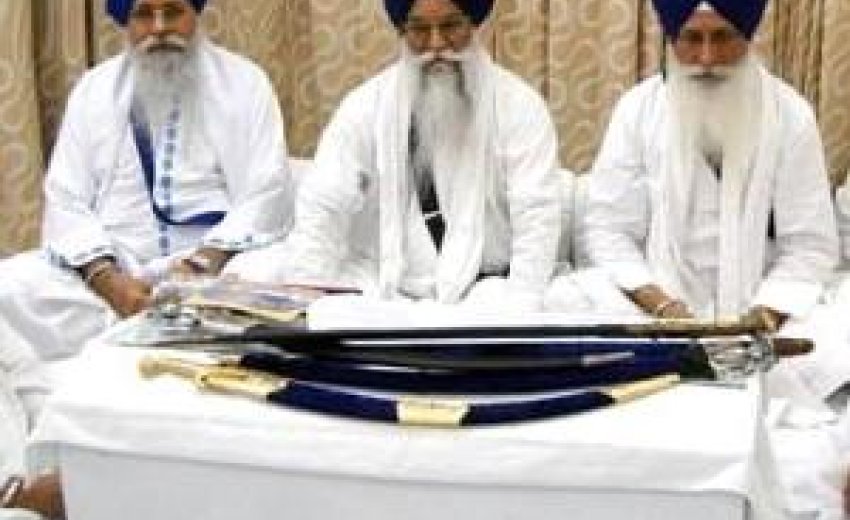Just days ago the current Jathedar of the Akal Takht released a new edict that he demands all Sikhs worldwide obey. As of now any home that has a (liquor) bar or alcohol served must not also have the Guru Granth. Why? Because it would be disrespectful to the Guru, he claimed.
This takes me back to the days when possession of the Bible and translations thereof were strictly prohibited for Christians.
Emil Durkheim (1858-1917) a preeminent social scientist of the time opined that religions existed primarily as the glue that unites people in families, clans, communities, townships and even nations. Religious bureaucracies emerge to help the variety of followers follow a somewhat common (standardized) protocol, and lessen controversy on how and what to do or what not to do, much as we have rules in secular society. But sometimes the keepers of the protocol become talibanesque and rigid; the glue that binds us, and that is religion, becomes more like crazy glue and destroys a people’s resilience and their freedom.
At one time for almost half a millennium the Roman Catholic Church approved only three languages for the Bible – Old or the New Testament – Aramaic, Greek and Latin. Translations into vernacular like English or French were not allowed and keeping of a Bible at home strictly prohibited for almost 200 years.
When Pope Innocent III banned access to the Bible by the common Christians his reasoning seemed entirely innocent. But then the road to hell is paved with good intentions, and the devil is in the details. He started the process in 1199. The ban came into effect in 1229 following the Council of Toulouse, which met in November of that year and led to the Inquisition. The Council of Tarragona of 1234, in its second canon, ruled that:
"No one may possess the books of the Old and New Testaments in the Romance language, and if anyone possesses them he must turn them over to the local bishop within eight days after promulgation of this decree, so that they may be burned lest, be he a cleric or a layman, he be suspected until he is cleared of all suspicion."
What was Pope Innocent III thinking when he started to build protective walls around the Biblical teachings? He opined that the mysteries of the faith can’t be easily explained to anyone and everyone. In fact, they can be understood only by those who are qualified to understand them. The depth of the divine Scriptures is such that even the educated and the gifted have difficulty understanding them is how he explained his actions. In other words, only the priestly hierarchy has the insight and the wisdom to understand and explain the teachings of the faith.
True that we Sikhs have not reached quite the level of obfuscation that the Roman Catholic Church climbed and mastered centuries ago but our direction seems not so different.
Should I say “Long live the Brahmins;” every religion has them, even the Roman Catholics and now it seems the Sikhs too, even though the Gurus spent over 200 years getting rid of such a dysfunctional hierarchy.
Can you imagine that?
Keep in mind that religions are for imperfect people; perfect masters don’t need institutions. The label “Sikh” recognizes those imperfections and speaks exactly of the journey. A Sikh remains a lifelong student of the Sikh way of life for whom the journey is the destination. We know the path to be endless. And any Sikh who claims to have reached the endpoint has surely slipped a notch or two.
Now to the edict from the Akal Takht! What can one say of such rigidity in the name of religion?
True that we would like NOT to see a Sikh reading the Guru Granth sahib with a glass of wine in his hand but that still leaves a distinct issue here that deserves to be addressed. These are individual infractions that should be managed at the local level by the local sangat at the local neighborhood gurduara. Such matters do not rise to the level of impeachable offences that need the Akal Takht for a judgment call. Only those issues should get to the Akaal Takht that impact our community life and sustainability as a collective.
There is a distinction between private personal behavior and public protocol. Undoubtedly, the community’s behavior is totally to be addressed by the institutions such as the Akaal Takht but micromanaging personal individual behavior may not be. Why? Because individuals remain imperfect beings and they are best goaded towards the common good by their friends and family – sangat of the local community.
The institutions should continue to preach, teach, recommend and persuade but NOT intrude so casually into private space. I am, therefore, more tolerant of individual errors of judgment – acts of omission and commission -- in the hope that progress will come in time as long as the person stays connected. How banning access to the scripture helps escapes me.
The only reason to intrude into such private behavior seems to be the one that the Akal Takht provided – that it is an insult to the Guru. My take would be that the Guru is so much larger and beneficent and that it is neither insulted and diminished nor flattered or enhanced by our puny efforts. Perhaps like a wise parent God and Guru overlook such behavior as childish.
Yes, discipline is necessary but not when it is harshly coercive and not necessarily corrective. Respect for Guru Granth comes as the engagement for the Word therein grows, and that will come from increasing access and not from banning access to it.
Keep in mind that such rash judgment is not the first that the Akal Takht has rendered. Not so long ago it banned all discussion on the so called Dasam Granth. If people do not discuss how do they learn and progress? There have been other quick-fix decisions as well such as summary excommunication of some individuals; these only speak of a hair-trigger finger and not a mature process of conflict resolution in place.
This long period in the history of the Roman Catholic experiment with suppression of scriptural access to common Christians ended with the fresh air of the Reformation -- a movement that perhaps owes its beginning to John Wycliffe’s 1382 translation of the entire Bible from Latin into English.
I know I spent more space here on the early troubles of the Roman Catholics. The Church learned expensive and traumatic lessons and it took over two centuries to do so. We Sikhs don’t need to relive such history.
When such community issues surface the decision makers at the Akal Takht need to act not in a hurry and not in secrecy but after canvassing “we the people” at open hearings – and due deliberation in an atmosphere of transparency and thoughtfulness.
On rereading what I have written here tells me that it is not likely to win me friends but my goal is not that. It is to foster a conversation.
Some people just never learn from history, do they?
September 21, 2013






